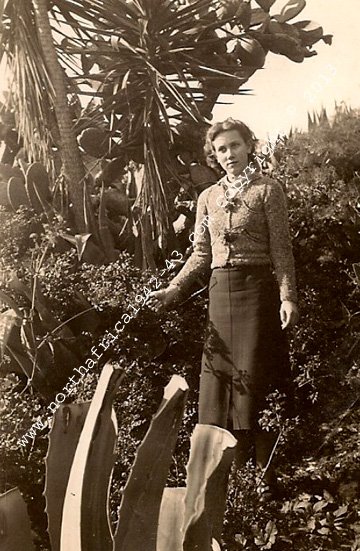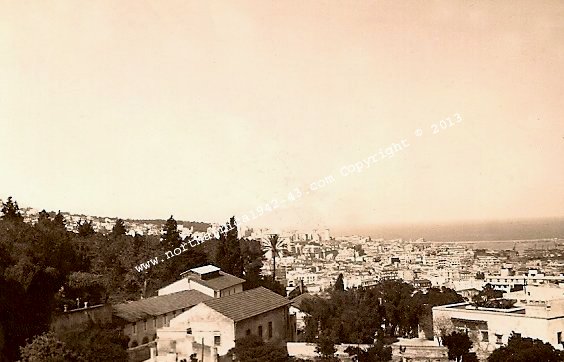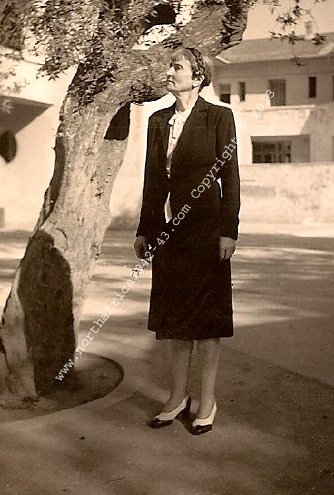








Simone FaflickSimone
Faflick was born in Brittany, a cultural region in the northwest of
France. I discovered Simone through my relationship with 9th Division
veteran William Maloney, who was aboard the USS Thomas Stone in the
39th Regiment 9th Division, North Africa, November 1942. When
Bill Maloney passed away, I connected with Simone through
Bill's daughter. William was married to Simone's sister Raymonde. They
met met in Algiers, where Simone's mother was a schoolmaster at La Redoute. Some of the 39th, 9th Division were bivouacked there after the landings in Algiers. Simone's early
life's story was quite amazing as
it relates to the invasion of North Africa 1942-43. As a young woman
she attended the University of Algiers, and beginning in 1939, she
soon experienced anxiety and uncertainty from a raging war in
Europe. In the summer of 1939, she and her family were forced to shorten
their visit to Pléneuf in Brittany as a menacing German U Boat prowled
the waters. Visiting her home country was no longer possible.
Back in Algiers, she began her first year at the University, while her
sister would resume her studies, and mother would return to teaching at
La Redoute. All this as the war was winding up. November 8th 1942 - Allied Forces Land in Algiers - From Simone's diary:"The
Allies had indeed landed! That very afternoon, right under my bedroom
window, I watched several companies of British soldiers swarm into our
schoolyard. Loaded with heavy gear, they had walked a good five miles
all the way from the harbor. By night time they had occupied more than
half of the school classrooms which, for the next two years,
would be housing Allied forces, British and American. My parents’
lodgings had always been an integral part of a school compound and I
had become almost oblivious of schoolyards noises. It took me quite a
while to get used to the level of noise that would reach us from the
soldiers quarters right under our bedroom windows." From
our interview in the summer of 2009, I was astounded to learn that
Simone had actually known the young man who assassinated Admiral
Darlan. His name was Ferdinand Bonnier de la Chapelle. They were both
members of a Gaullist movement among the students that
eventually became the "Corps Franc d’Afrique." You can see an excerpt
about that incident here: Admiral Darlan. Simone would continue to have many exciting experiences; some would prove to be terrifying: "One
afternoon, as I was on my way home waiting at the bus stop, a complete
stranger, a man in his thirties, accosted me. He told me that he also
was from Brittany and started to lecture me. He repeated over and over
that he could not understand why a nice girl like me, of pure French
descent, could fraternize with Jewish radicals. I argued a bit and was
able to brush him off. Twice, later that week, I found him waiting for
me at the same spot. He tried again to win me to his cause and was so
insistent that to ignore him was impossible, so I just stood there in
complete silence and prayed for the bus to come soon. He never showed
himself again but I was quite shaken and for a long time I wondered if
he was still around . Why Me?" Despite
the invasion of Allied forces, Algiers was still not completely safe. There were air raids on a daily basis from
JU-88's. In fact, during this period the USS Thomas Stone
continued to be bombed and strafed. Some of the German planes were
caught in barrage balloons in the harbor, many others were shot down by anti-aircraft
batteries.
"One morning was as I was riding the bus, there were the shrieking sounds of sirens. Everyone had to get off the bus. I could
not miss my class. Taking a detour through a small park I felt somewhat
protected by the trees. Once in the avenue I started running from
building to building, stopping at each doorstep to inspect the sky. I
did get to my class alive and in time. Another day, a very gruesome
sight welcomed the students at the University. A German soldier, all
entangled in his parachute, had fallen and died impaled by the spikes
of the main gate." By
mid February of 1943, the campaign in North Africa
reached its peak as 10,000 allies became causalities at the battle of
Kasserine Pass. The bombing of Algiers intensified and news were
that the Germans who by then had occupied Tunisia would be advancing
west. Simone possessed needed talents and skills that soon would
be put to use: "In
the middle of June I was contacted by the Language Department of the
University. The Liaison Section of the French Army was looking for
possible candidates - interpreters were badly needed by the British and
American headquarters in Algiers. I decided to volunteer. After a
four-week training session in a French Army camp I became a Second
Lieutenant in the Liaison Section of the French Etat Major General de
Guerre. The training session was easier than I had anticipated. We were
all university graduates chosen for their competence in English but also I believe for their congeniality." The following photos are from Simone Faflick's memoirs    View of the City of Algiers from Simone's window  Simone Faflick's mother, Eulalie Leboulanger  Simone Faflick 2nd Lt., 4th from left, Liaison Section of the French Etat Major General de Guerre Photos and memorabilia provided by the veterans and their families. This independent documentary is not intended to be a comprehensive account of the war in North Africa 1942-43. The completed film will feature rare interviews from veterans connected to the story. The search to locate veterans within this time frame was very difficult. With no funding and a small film crew who sporadically assisted with re-creations, the bulk of production falls upon one individual. Contributions of any kind are welcomed. northafricaww2survivors@gmail.com Photos, illustrations, art work or interviews may not be reproduced, copied, stored, manipulated or redistributed without the expressed permission of the author. Michael Fraticelli - North Africa 1942-43 Survivors' Stories © 2015 |
